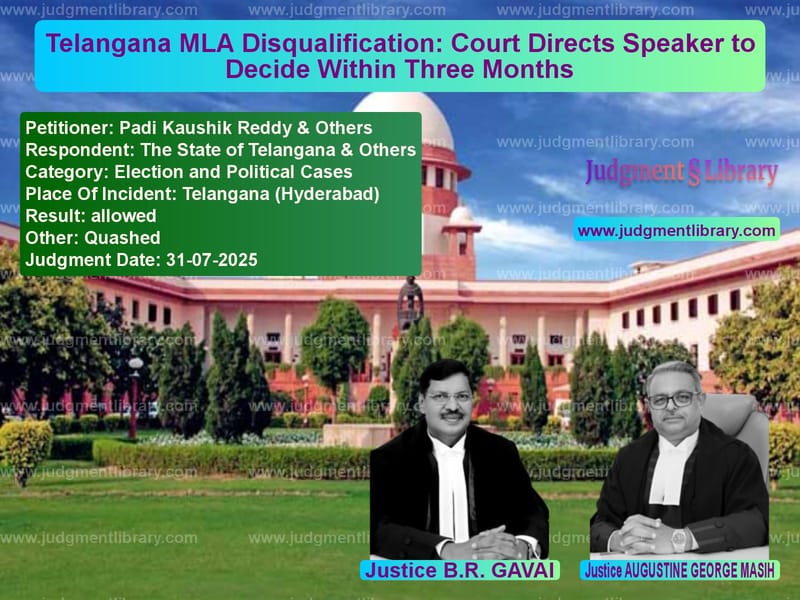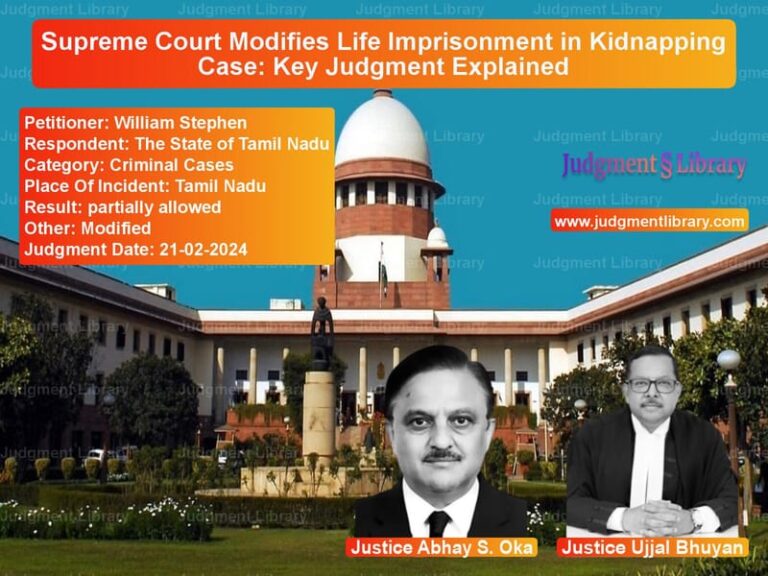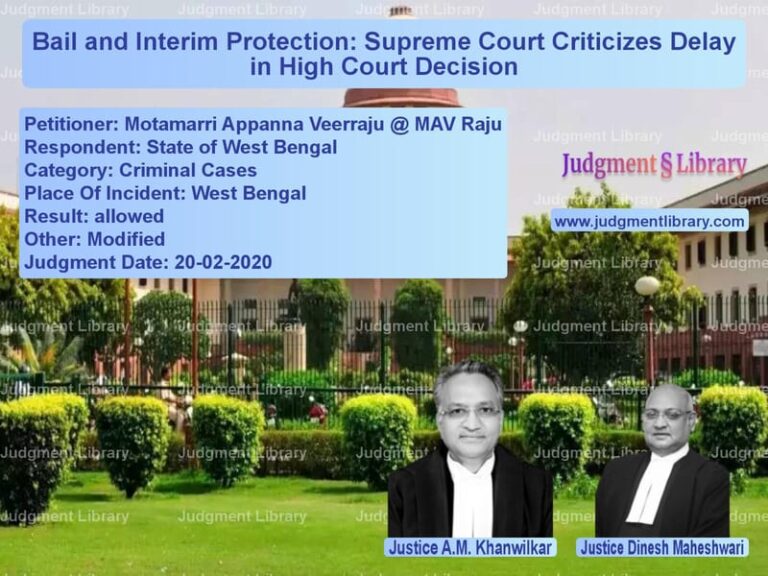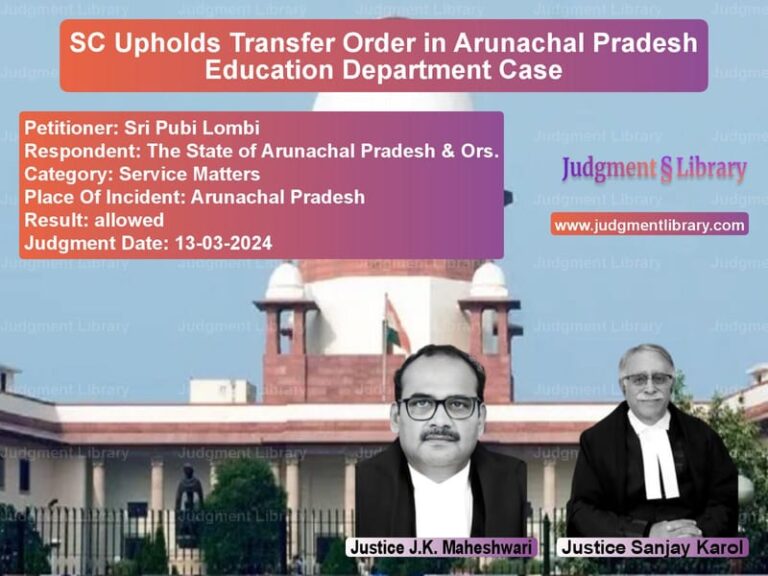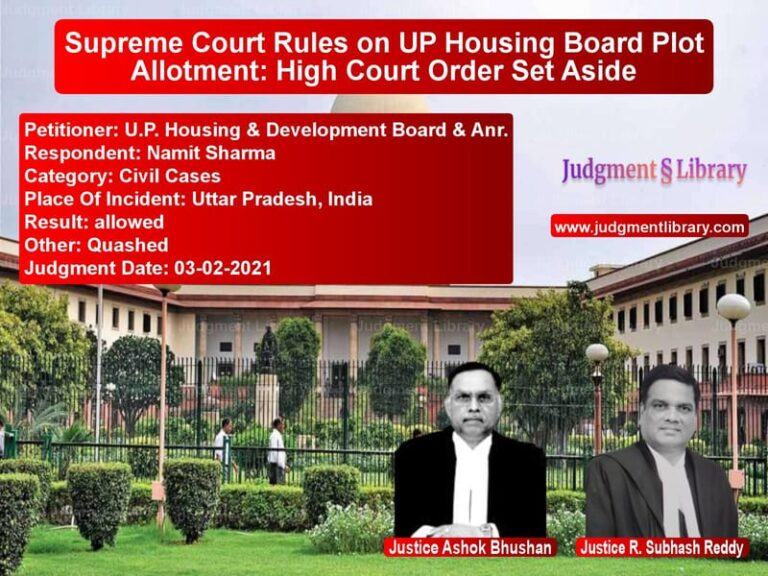Telangana MLA Disqualification: Court Directs Speaker to Decide Within Three Months
The Supreme Court’s judgment dated July 31, 2025 in Padi Kaushik Reddy & Others v. The State of Telangana & Others addresses a recurrent and constitutionally sensitive problem — delay in adjudication of disqualification petitions under the Tenth Schedule (the anti-defection code). The decision revisits constitutional jurisprudence on the role of the Speaker as the adjudicating authority under Paragraph 6 of the Tenth Schedule and balances the principle of exclusive competence of the Speaker with the need to prevent delay that frustrates democratic choice.
What happened — short factual background
Following the Telangana Legislative Assembly elections held in late 2023, three MLAs originally elected on the banner of one party were alleged to have joined another political party in early 2024. Fellow MLAs filed disqualification petitions under Paragraph 2(1) of the Tenth Schedule and the Telangana Assembly’s Disqualification Rules, 1986. Months passed without a substantive decision by the Speaker, despite statutory procedures and repeated petitions. The petitioners approached the High Court; a Single Judge issued directions to place the petitions before the Speaker within four weeks, but a Division Bench set aside that order. The matter reached the Supreme Court on special leave.
The core legal tension
The case posed two firm, competing constitutional propositions. On one side petitioners argued that prolonged inaction by the Speaker effectively nullifies the Tenth Schedule’s objective of checking defections and that courts must be able to ensure prompt adjudication in appropriate cases. As one of the petitioners’ senior counsel submitted verbatim: “If such a situation is permitted to continue only on account of not deciding the disqualification petitions within a particular period, it would be nothing less than playing a fraud on democracy.”
On the other side, counsel for the respondents submitted that the Tenth Schedule makes the Speaker the exclusive adjudicatory authority, and courts must not direct the Speaker on the manner or timetable of adjudication. The respondents’ position included the submission, in their words, that “the High Courts cannot exercise powers under Article 227 of the Constitution” in a way that intrudes on the Speaker’s function under the Tenth Schedule.
What the Supreme Court held — balancing exclusivity and accountability
The Court carefully reviewed the line of precedents: Kihoto Hollohan, Rajendra Singh Rana, Subhash Desai, and the three-judge decision in Keisham Meghachandra Singh. It reiterated the constitutional finding that the Speaker, when adjudicating under Paragraph 6, acts in a judicial/tribunal capacity and that the scope of judicial review is narrow — confined to jurisdictional errors, mala fide, non-compliance with rules of natural justice and perversity.
Importantly, the Court reproduced the precise formulation from prior law that frames the limits of judicial intervention. The judgment quotes verbatim:
“In view of the limited scope of judicial review that is available on account of the finality clause in Paragraph 6 and also having regard to the constitutional intendment and the status of the repository of the adjudicatory power i.e. Speaker/Chairman, judicial review cannot be available at a stage prior to the making of a decision by the Speaker/Chairman and a quia timet action would not be permissible. Nor would interference be permissible at an interlocutory stage of the proceedings. Exception will, however, have to be made in respect of cases where disqualification or suspension is imposed during the pendency of the proceedings and such disqualification or suspension is likely to have grave, immediate and irreversible repercussions and consequence.”
And the judgment further records the Constitution Bench’s summation verbatim:
“That the Tenth Schedule does not, in providing for an additional grant (sic ground) for disqualification and for adjudication of disputed disqualifications, seek to create a non-justiciable constitutional area. The power to resolve such disputes vested in the Speaker or Chairman is a judicial power.
That Paragraph 6(1) of the Tenth Schedule, to the extent it seeks to impart finality to the decision of the speakers/Chairmen is valid. But the concept of statutory finality embodied in Paragraph 6(1) does not detract from or abrogate judicial review under Articles 136, 226 and 227 of the Constitution insofar as infirmities based on violations of constitutional mandates, mala fides, non-compliance with Rules of Natural Justice and perversity, are concerned.
That the deeming provision in Paragraph 6(2) of the Tenth Schedule attracts an immunity analogous to that in Articles 122(1) and 212(1) of the Constitution … The Speakers/Chairmen while exercising powers and discharging functions under the Tenth Schedule act as Tribunal adjudicating rights and obligations under the Tenth Schedule and their decisions in that capacity are amenable to judicial review.”
Relief granted
Applying these principles to the facts, the Supreme Court concluded that the Division Bench’s setting aside of the Single Judge’s limited and procedural direction was not sustainable given the prolonged inaction in the particular factual matrix. The Court therefore allowed the appeals and, while respecting the Speaker’s role as the primary adjudicator, issued a concrete direction: the Speaker was directed to conclude the pending disqualification proceedings in respect of the MLAs concerned as expeditiously as possible and in any case within three months from the date of the judgment. The Court additionally directed that any attempt by a respondent-MLA to protract proceedings would attract an adverse inference.
Why this decision matters
The judgment is significant because it threads a constitutional needle. It affirms the exclusive adjudicatory domain of the Speaker under the Tenth Schedule and the narrow compass of judicial review, yet recognizes that constitutional mechanisms cannot be rendered ineffective by indifference or delay. By setting a clear timeline — not to micromanage the Speaker’s decision-making but to prevent frustration of democratic processes — the Court strikes a pragmatic balance between institutional autonomy and judicial protection of constitutional values.
For practitioners and political actors, the decision signals that courts will intervene when delay undermines the Tenth Schedule’s object. For citizens, it reiterates that procedural inaction that erodes electoral mandates will not be tolerated in the name of institutional deference.
Petitioner Name: Padi Kaushik Reddy & Others.Respondent Name: The State of Telangana & Others.Judgment By: Justice B.R. GAVAI, Justice AUGUSTINE GEORGE MASIH.Place Of Incident: Telangana (Hyderabad).Judgment Date: 31-07-2025.Result: allowed.
Don’t miss out on the full details! Download the complete judgment in PDF format below and gain valuable insights instantly!
Download Judgment: padi-kaushik-reddy-&-vs-the-state-of-telanga-supreme-court-of-india-judgment-dated-31-07-2025.pdf
Directly Download Judgment: Directly download this Judgment
See all petitions in Other Cases
See all petitions in Judgment by B R Gavai
See all petitions in Judgment by Augustine George Masih
See all petitions in allowed
See all petitions in Quashed
See all petitions in supreme court of India judgments July 2025
See all petitions in 2025 judgments
See all posts in Election and Political Cases Category
See all allowed petitions in Election and Political Cases Category
See all Dismissed petitions in Election and Political Cases Category
See all partially allowed petitions in Election and Political Cases Category

